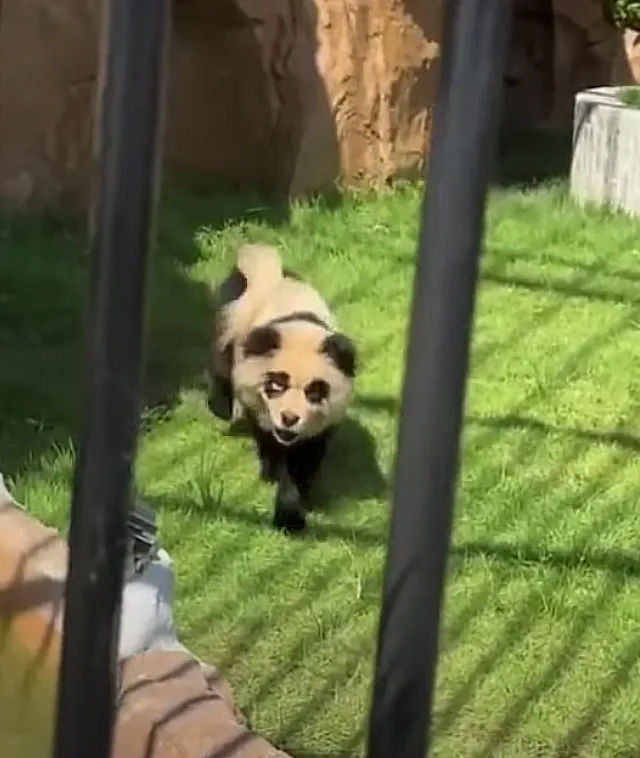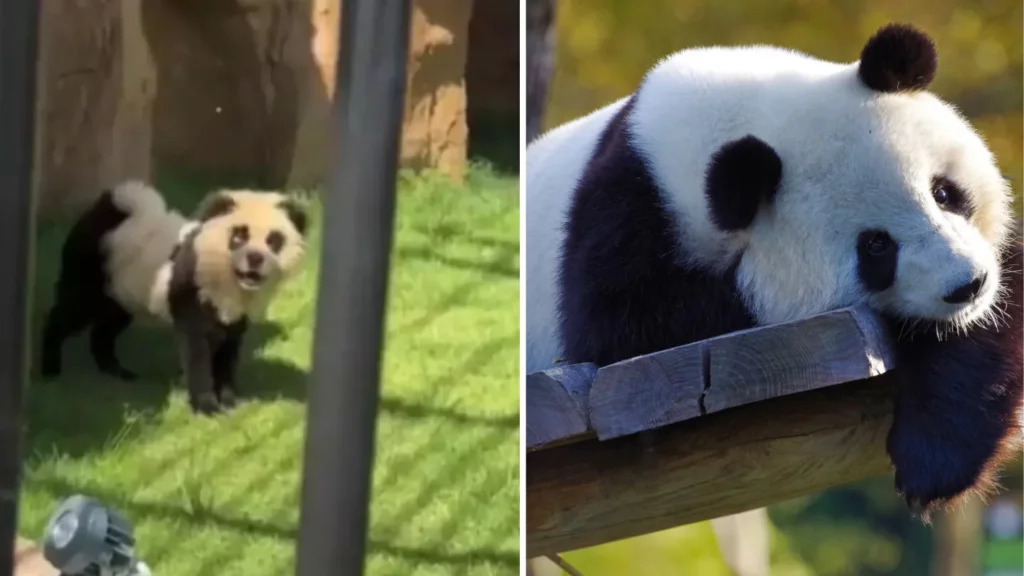Visitors at a well-known zoo in Guangyuan, China, have recently become involved in an unusual controversy. The intended opportunity to witness one of the world’s most cherished animals took an unexpected turn.
The exhibit offered a unique opportunity to view rare and exotic creatures. Animal enthusiasts gathered eagerly, anticipating the chance to witness the renowned black-and-white inhabitants rumored to be on display.
As visitors gathered around the enclosure, the animals showed up to be real creatures. The creatures showcased recognizable black-and-white patterns and had the charming, fluffy look that one would expect from pandas.
Some enjoyed the sunlight while others strolled casually, capturing the attention of onlookers. However, as the day progressed, an unsettling feeling began to grow among the visitors.

The situation was not obvious right away. An increasing crowd of observers started to note the unusual actions of the animals.
As they walked through the area, the sounds coming from the enclosure were quite surprising. An unexpected noise replaced the usual panda sounds, a twist that caught many off guard.
The captivating environment began to fade as whispers of uncertainty circulated. The sudden, loud barking from the enclosure surprised the guests.
That’s when it finally clicked for them: these weren’t pandas at all. The guests were actually admiring Chow Chow dogs, dyed black and white to resemble pandas.
The zoo had staged an elaborate and surprising trick. Guests who had purchased tickets to view unique wildlife expressed their disappointment and frustration.

A guest managed to snap a now-famous photo of a “panda” relaxing with its tongue hanging out. They spotted another “panda” wandering in the shade, oblivious to the growing anger around them.
An intriguing display quickly turned into a source of rage. Upon discovering the truth, a significant number of visitors requested refunds.
Zoo officials, on the other hand, refuted any allegations of fraud. They claimed that they had never clearly designated the creatures as pandas.
The zoo defended their decision, citing the animals’ classification as “panda dogs.” The incident rapidly ignited intense discussions surrounding deception.
The team admitted that they dyed the Chow Chows to compensate for the lack of genuine pandas. Even though they maintained their innocence, the response was immediate and intense.

People regarded employing dogs to mimic one of the world’s most at-risk species as more than just a smart tactic. For numerous individuals, it turned into a representation of the lengths that zoos could reach to draw in guests.
This is not the first instance where a zoo in China has been investigated for similar actions. A zoo in Jiangsu Province has made headlines with a similar attempt.
They showcased dyed Chow Chows labeled as “panda dogs,” which left visitors feeling even more frustrated. The zoo captured interest by trying to increase ticket sales during the festive season.
Tickets featured the phrase “Xiong Mao Quan,” which means “panda dogs” in English. The display deceived numerous attendees as they left.
In the Taizhou incident, onlookers, similar to those in Guangyuan, felt an unsettling atmosphere when they were met with the sound of barking. A visitor named Chen expressed her discontent upon uncovering the reality.
“I decided to visit the zoo, expecting to see giant pandas. But when I arrived, I found Chow Chow dogs instead,” she said after her video went viral.

Both zoos are experiencing increased backlash on social media. Numerous individuals have raised concerns regarding allegations of animal mistreatment and misleading practices, with a growing demand for greater transparency.
A pet beautician clarified worries regarding the dyeing of animals by clarifying the use of organic, plant-based dyes. She indicated that this would not be detrimental to the dogs.
Despite this, the strong reactions have focused on the feelings of betrayal experienced by those who visited. They arrived with the expectation of witnessing one of China’s most cherished creatures.
The debate has sparked broader discussions about the ethics of zoos’ marketing strategies. Legal experts indicate that guests might have valid reasons to assert they were misled due to unfulfilled promises.
“Visitors are bound to feel cheated when they discover the truth,” a legal expert remarked. “Zoos should be more transparent in their practices.”
With increasing public attention, it seems both the Guangyuan and Taizhou zoos might have to reconsider their approaches. As public sentiment shifts, the era of these tactics could come to an end.
Currently, the “panda dogs” continue to be fascinating entertainment. As investigation intensifies, individuals may grow cautious of taking information at face value
Feature Image Credit: (Asia Wire)





